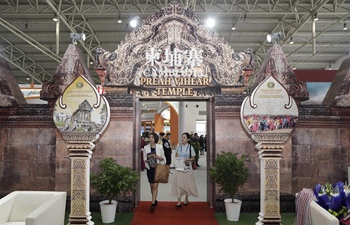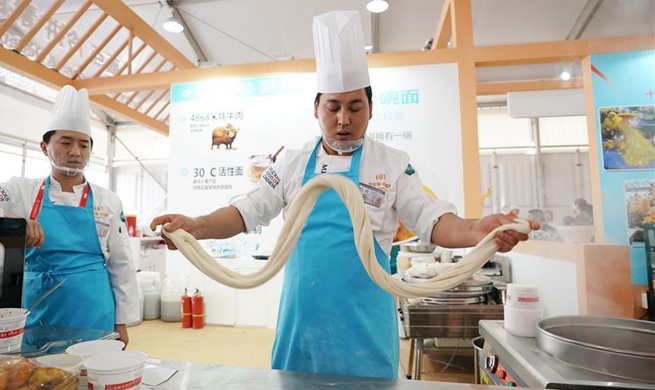By Xinhua writer Zhang Zhongkai
NANCHANG, May 18 (Xinhua) -- Surrounded by verdant hills and nestled amid bamboo forests and grass meadows, a two-floor wood and earth house is so old and worn that its stairs shake when people walk on them.
However, in the eyes of Tony Fang, an architectural designer, the dilapidated but quaint cottage in Baoentai Village of Luxi County in southeast China's Jiangxi Province is going to be the next must-see and even must-live spot while traveling in the region.
"Traditional village houses have huge potential for drawing tourists and lodgers thanks to their unique charm -- the charm of nature and local culture," Fang said.
Fang is one of the housing designers competing for bed and breakfast (B&B) design prizes worth over six million yuan (about 872,000 U.S. dollars), as the local government plans to leverage these designers' talent to transform not only old houses into charming B&Bs but also the villages into emerging travel destinations.
B&Bs sprung up in villages after the Chinese government unveiled guidelines to vitalize rural areas in 2018, highlighting the development of rural B&Bs with sound infrastructure and diverse functions to promote sharing economy and local tourism.
In addition to developing high-quality landmark B&Bs, the county will increase infrastructure investment such as transport to support rural tourism, said local Party chief Yang Jinsong, who hopes these premium B&B projects will enliven local tourism by drawing more travelers to visit and stay longer.
Rural tourism is booming as increasingly affluent urban dwellers tend to drive to the countryside for leisure during weekends and short holidays. The continuous expansion of high-speed railway networks also makes it more convenient for tourists from faraway places to enjoy different rural landscapes in other provinces.
China's tourism authority issued a general set of tourism standards for B&Bs in 2017, and local governments have been trying to catch up with the sector's rapid expansion by developing tailor-made regulations and support.
The rural B&B market consumption is expected to reach 36.3 billion yuan in 2020, with an average annual growth rate of 16 percent. It has become an emerging opportunity that home-sharing and travel services providers are vying to seize. Domestic home-rental giant Tujia saw a 300-percent surge as of mid-November 2018 for rural B&Bs on its platform over that of the whole of 2017.
"B&B development poses a sustainable path for enriching rural areas. By offering unique and comfortable lodging and cultural experiences, they can lure a steadily growing group of consumers," said Li Yaying, CEO of Beijing-based Duo Meihao, a village cultural and tourism industry chain service provider.
One of the charming villages promoted on Duo Meihao's platform is an ancient fishing village called Huagang. The coastal village in eastern China's Wenzhou City has become famous online, especially among young travelers and on social media, thanks to several stylish B&Bs renovated from traditional stone houses.
"A renovation of a house has the potential of vitalizing the whole village," Li said.

















